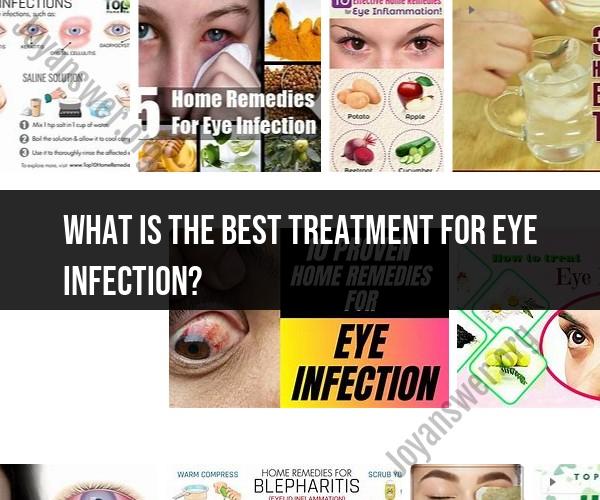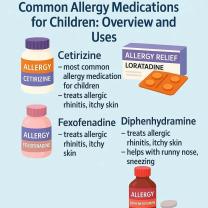What is the best treatment for eye infection?
The best treatment for an eye infection depends on the specific type and cause of the infection. Eye infections can be caused by bacteria, viruses, fungi, or other factors, and the treatment approach may vary accordingly. Here are some common types of eye infections and their recommended treatments:
Bacterial Conjunctivitis (Pink Eye):
- Antibiotic eye drops or ointments are typically prescribed to treat bacterial conjunctivitis. Common antibiotics include erythromycin, bacitracin, or sulfacetamide. Warm compresses can also help relieve discomfort.
Viral Conjunctivitis (Viral Pink Eye):
- Viral conjunctivitis, often caused by adenoviruses, does not respond to antibiotics. Treatment primarily involves managing symptoms. Lubricating eye drops and cold compresses can provide relief. In some cases, antiviral eye drops may be prescribed for severe infections.
Allergic Conjunctivitis:
- Antihistamine eye drops or oral antihistamines can help alleviate the symptoms of allergic conjunctivitis, such as itching and redness. Avoiding allergens is also important.
Fungal Eye Infections:
- Fungal eye infections are less common but can be severe. Treatment typically involves antifungal eye drops or oral antifungal medications. In some cases, surgical intervention may be necessary to remove infected tissue.
Herpes Simplex Virus (Herpetic Eye Infections):
- Antiviral medications are used to treat eye infections caused by the herpes simplex virus. These may be prescribed in the form of oral medications, topical antiviral ointments, or eye drops. These infections may require ongoing management.
Keratitis (Corneal Infections):
- The treatment of keratitis depends on the underlying cause, which can be bacterial, viral, fungal, or parasitic. Treatment may include topical or oral medications specific to the cause.
Stye (Hordeolum):
- Warm compresses can help relieve the discomfort of a stye and promote drainage. In some cases, a healthcare professional may need to incise and drain the stye.
Chalazion:
- A chalazion is a blocked oil gland in the eyelid. Warm compresses can encourage drainage. In some cases, a healthcare provider may need to make a small incision to remove the blocked material.
Preseptal and Orbital Cellulitis:
- These serious bacterial infections require immediate medical attention. Treatment often involves hospitalization and intravenous antibiotics. Surgical drainage may be necessary for orbital cellulitis.
Trachoma:
- Trachoma is a chronic chlamydial infection that can lead to blindness if left untreated. It is treated with oral antibiotics, such as azithromycin or doxycycline.
It's important to consult an eye care specialist or healthcare provider for an accurate diagnosis and appropriate treatment of an eye infection. Self-diagnosis and treatment can lead to complications or ineffective management of the infection. Do not use prescription medications without proper guidance from a healthcare professional. Proper hygiene, such as frequent handwashing and avoiding touching the eyes, can also help prevent the spread of eye infections.
Best Treatment for Eye Infections: A Comprehensive Guide
The best treatment for eye infections depends on the type of infection and its severity. Some eye infections can be treated at home with simple remedies, such as warm compresses and over-the-counter pain relievers. Other eye infections may require prescription medication or surgery.
Types of Eye Infections and Their Effective Treatments
Here are some of the most common types of eye infections and their effective treatments:
- Bacterial conjunctivitis (pink eye): Bacterial conjunctivitis is a common eye infection caused by bacteria. It can be treated with prescription antibiotic eye drops or ointments.
- Viral conjunctivitis: Viral conjunctivitis is a common eye infection caused by a virus. It is usually self-limiting and does not require treatment. However, over-the-counter pain relievers and artificial tears can help to relieve symptoms.
- Allergic conjunctivitis: Allergic conjunctivitis is an eye infection caused by an allergic reaction. It can be treated with over-the-counter or prescription antihistamine eye drops.
- Keratitis: Keratitis is an inflammation of the cornea, the clear front part of the eye. It can be caused by bacteria, viruses, or fungi. Keratitis is treated with prescription antibiotic, antiviral, or antifungal eye drops.
- Uveitis: Uveitis is an inflammation of the uvea, the middle layer of the eye. It can be caused by a variety of factors, including infection, autoimmune disorders, and trauma. Uveitis is treated with prescription anti-inflammatory medications.
Home Remedies and Medical Interventions for Eye Health
There are a number of home remedies and medical interventions that can help to improve eye health and reduce the risk of eye infections.
Home remedies:
- Warm compresses: Warm compresses can help to relieve pain and inflammation caused by eye infections.
- Over-the-counter pain relievers: Over-the-counter pain relievers, such as ibuprofen and acetaminophen, can help to relieve pain and inflammation caused by eye infections.
- Artificial tears: Artificial tears can help to lubricate the eyes and relieve dryness and irritation.
Medical interventions:
- Prescription eye drops and ointments: Prescription eye drops and ointments can be used to treat a variety of eye infections, including bacterial conjunctivitis, keratitis, and uveitis.
- Surgery: Surgery may be necessary to treat some eye infections, such as uveitis and fungal keratitis.
Recognizing the Signs and Symptoms of Eye Infections
Some of the most common signs and symptoms of eye infections include:
- Redness
- Swelling
- Pain
- Discharge
- Itching
- Blurred vision
- Sensitivity to light
If you experience any of these signs or symptoms, it is important to see a doctor to get a diagnosis and treatment plan.
Stories of Recovery and Care for Eye Infection Patients
Here are a few stories of recovery and care for eye infection patients:
- "I developed pink eye a few months ago. My eye was red, swollen, and watery. I went to the doctor and he prescribed antibiotic eye drops. After using the eye drops for a few days, my eye started to improve. After a week, my eye was completely healed." - Sarah, 25-year-old female
- "My son developed keratitis from wearing his contact lenses for too long. He had to see an eye specialist and he was prescribed prescription antibiotic eye drops. My son had to wear the eye drops for a few weeks, but his eye eventually healed." - Mike, 40-year-old male
- "I have uveitis and I have to see an eye specialist every few months to get injections of steroids in my eyes. The injections help to reduce the inflammation and prevent my vision from deteriorating." - John, 35-year-old male
If you have an eye infection, it is important to follow your doctor's instructions and to take your medication as prescribed. With proper treatment, most eye infections can be resolved quickly and completely.













